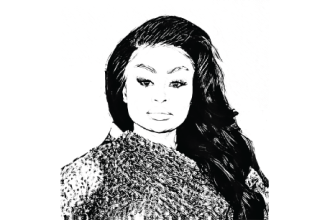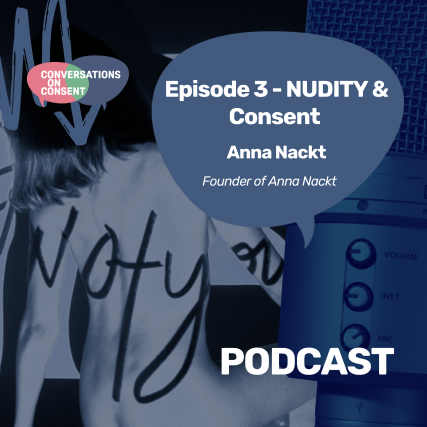NUDITY
& CONSENT
Join the conversation on:
NUDITY & CONSENT
Featuring Anna (Anna Nackt)
Anna, initiator of Anna Nackt, joins our conversation on nudity and how it relates to consent, censorship and shame and why we should not call image-based sexual violence (IBSV) revenge porn.
Key Terms and Definitions
Here we clarified key terms and definitions to understand the topic better.
“Deepfake pornography is conventional pornography that has been doctored, often by Artificial Intelligence (AI) technology, so as to insert a celebrity appearing as (most commonly) the female actress starring in the scene, replacing the original porn performer.”
“Non-consensual pornography (the most common form of which is known as ‘revenge porn’) involves the online distribution of sexually graphic photographs or videos without the consent of the individual in the images.”
Did you know… ?
Here are facts and figures on the topic.
In Europe, it is estimated that one in ten women have experienced some form of sexual harassment or violence online.
In the US, one in twelve persons, of which 54% are women, were a survivor of IBSA.
Turkey saw a rapid increase of image-based sexual abuse during the pandemic with the rate of women exposed to digital violence being 27 times higher than men according to the latest studies noting that the increase in reports of image-based abuse or so-called “revenge porn” skyrocketed during COVID-19
A study in the US showed that 93% of image-based sexual abuse survivors suffered significant emotional distress as a result.
In the UK, as many as one in three IBSV allegations are dropped due to a lack of anonymity and law enforcement support.
Want to help spread the word? Share our animation on NUDITY
Here are a few quick facts and some easy to understand information on this topic. Feel free to post to your social media accounts to get your friends involved.
Share now:
Nudity Resources
Check out the following resources to learn more about nudity and consent.
Anna Nackt
WEBSITE
Insecure Otis has all the answers when it comes to sex advice, thanks to his therapist mom. So rebel Maeve proposes a school sex-therapy clinic.
The Continuum of Image-Based Sexual Abuse
ACADEMIC PAPER
#NotYourPorn
WEBSITE
Revenge Porn
DOCUMENTARY
This BBC Three documentary explores the impact that explicit images being shared maliciously without someone’s consent can have on victims and highlights support available to them.
Am I In Porn?
WEB SEARCH TOOL
Power Up, Speak Out! is a five-lesson toolkit for educators that encourages middle school students to think critically about healthy relationships, power dynamics, boundaries, and consent. Our lessons teach students what TO DO, instead of what NOT to do.
Myth Busters
Nudity and consent are topics that are often misunderstood because of the myths surrounding them, here we want to clean up some of the most prominent misconceptions.
How to…
Check out these guidelines that help you to have conversations on consent.
... deal with intimate images that my partner (or ex) has shared with me?
Advice: Do not add to the culture of humiliation by sharing any nudes without consent. Do not share any imagery they trusted you with and ideally delete them permanently post-breakup.
... handle a situation in which images have been shared with me that weren’t intended for me?
Advice: Stop the circulation and delete these images. Become an engaged bystander by explaining to the sender why sharing these images is wrong and illegal, and asking them to stop spreading them and deleting them. If possible, safe, and relevant, report this case of IBSA and inform the person concerned whose images have been leaked.
... talk to my friends, children, family about IBSA?
Advice: Check out the resources for additional material that will help you have conversations on consent. Sex and relationships education should involve discussions about consent, abuse, pornography and equality.
Nudity and Consent Cases
Here we highlight prominent cases.
Mia Khalifa
CASE:
Former pornstar, Mia Khalifa exited the industry in 2014. Even though she has left the industry, websites do still profit by hosting videos under her name. A petition backed with 1.5 million signatures calls for her videos to be taken down from popular porn sites.
ANALYSIS:
This case is an example of how huge porn companies are notorious for profiting from non-consensual content or coerced contracts.

Rob Kardashian and Blac Chyna
CASE:
In 2017, Rob Kardashian posted intimate images of his ex Blac Chyna, which resulted in an Instagram violation and subsequently, a deleted account. He then suggested his followers follow his Twitter when he continued to share the images. As Blac Chyna was a stripper, the case was trivialized.
ANALYSIS:
This case shows how we reduce women to their sexual conduct and shows a violation of a woman’s autonomy. Being a stripper does not imply that she consents to the circulation of her images. This case also illustrates how celebrities or partners associated with famous families have no say in the matter of their private images – and they are necessary to share.

Celebgate
CASE:
“Celebgate” is one of the biggest celebrity hacks that took place in Hollywood in 2014 which hacked and shared nude photos of multiple celebrities including Jennifer Lawrence and Kirsten Dunst. Jennifer Lawrence compared the violation to a sex crime. Searches for her on google skyrocketed.
ANALYSIS:
This story is an example of the virality with which nude images are spread due their explicit nature – and the victims are shockingly women. The fact that the story was sensationalized and resulted in more searches for Jennifer Lawrence, goes to show how people may have a complete disregard for the victim’s experience.

Know Your Rights
Australia
All non-consensual creation and/or distribution of intimate sexual images, including threats to do so are straightforwardly criminalised.
Law: Australian Crimes Amendment (Intimate Images) Act 2017
(Australian Crimes Amendment (Intimate Images) Act 2017)
France
IBSV may be sanctioned by 2 years of imprisonment and a 60.000 euro fine.
Law: Digital Republic Act
(Republique Numerique)
Germany
A person also has the right to object to the unauthorised dissemination or public display of his/her photograph
Law: Section 22, Art Copyright Law
(Bundesministerium der Justiz)
Turkey
There is definition of image-based sexual abuse in Turkish Law. Trials are conducted under Turkish Criminal Law for crimes of Disrupting People’s Peace and Peace, Sexual harassment, Threatening, Insult, Violation of the Privacy of Private Life, Violation of Communications Confidentiality, but there is not direct law against IBSA specifically.
(kockam)
UK
In the UK, in April 2015 it became a criminal offence with maximum of two-years imprisonment to share private sexual photographs or videos without the subject’s consent providing the intent of causing distress to those targeted. In September 2016 it was announced that more than 200 people had been prosecuted since the law came into effect.
Law: Section 33, Criminal Justice Courts Act
(Criminal Justice and Courts Act 2015)
USA
46 states and Washington DC prohibit the distribution and creation of non-consensual pornography.
(Ballotpedia)
We are evolving as we share
Let us know about your comments and feedback on the information provided on our website. Is there anything to be added or adjusted? Simply contact us.

Stay up to date with the latest podcasts, new resources, and progress with our petition.





